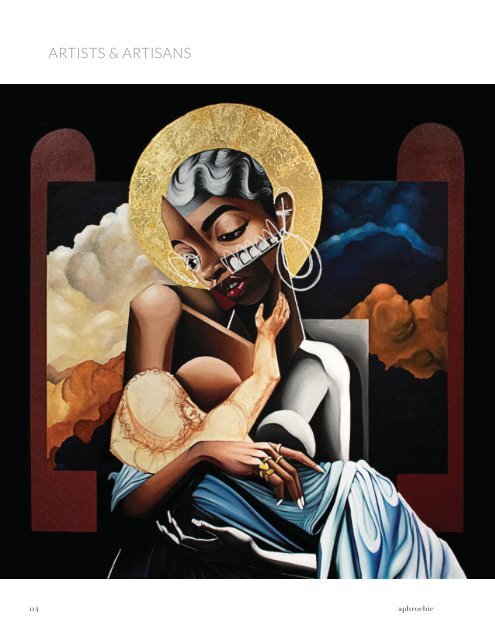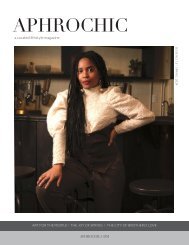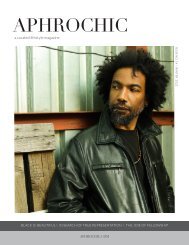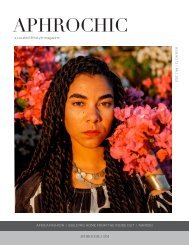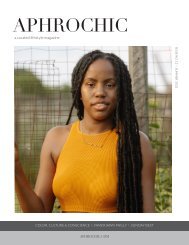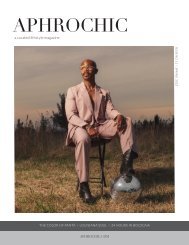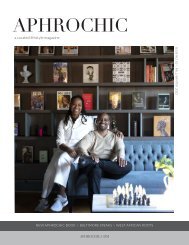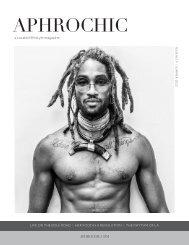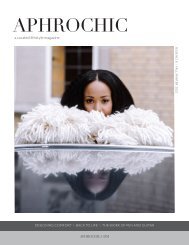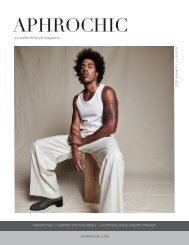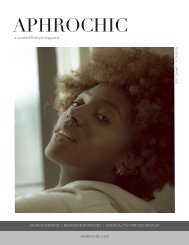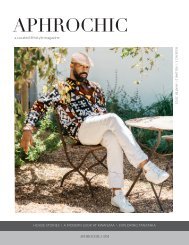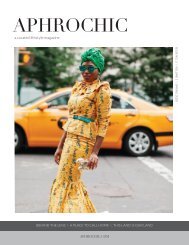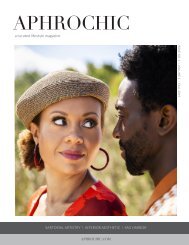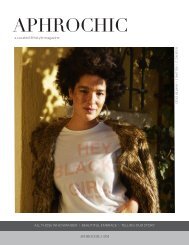AphroChic Magazine: Issue No. 4
In this issue, we sit down with artist, Malik Roberts, who relates the experience of creating one of the few African American artworks to sit permanently in the Vatican collection. Fashion designer, Prajjé Oscar John-Baptiste introduces his latest collection — an ode to Haiti, and its goddesses. We head to South Carolina to experience the Gullah-inspired music of Ranky Tanky. And in New York, we watch a new world being born with photographer and journalist, Naeem Douglass, who takes us inside the city’s Black Lives Matter protests, and economist Janelle Jones, who reminds us in these times that we are the economy. We are thrilled to share our cover with chef and musician, Lazarus Lynch. Inside, we talk with him about his cookbook, Son of a Southern Chef and his new album, I’m Gay. From a house tour in Brooklyn to a travel piece in Tobago, this issue takes you all over the Diaspora. And we see how of the concept of Diaspora was first introduced in a look back at how Pan-Africanism led the way to how we think of international Blackness today. It is a showcase of our culture, our creativity, our resilience, and our diversity, our demands for the present and our hopes for the future. Welcome to our summer issue.
In this issue, we sit down with artist, Malik Roberts, who relates the experience of creating one of the few African American artworks to sit permanently in the Vatican collection. Fashion designer, Prajjé Oscar John-Baptiste introduces his latest collection — an ode to Haiti, and its goddesses. We head to South Carolina to experience the Gullah-inspired music of Ranky Tanky. And in New York, we watch a new world being born with photographer and journalist, Naeem Douglass, who takes us inside the city’s Black Lives Matter protests, and economist Janelle Jones, who reminds us in these times that we are the economy.
We are thrilled to share our cover with chef and musician, Lazarus Lynch. Inside, we talk with him about his cookbook, Son of a Southern Chef and his new album, I’m Gay.
From a house tour in Brooklyn to a travel piece in Tobago, this issue takes you all over the Diaspora. And we see how of the concept of Diaspora was first introduced in a look back at how Pan-Africanism led the way to how we think of international Blackness today. It is a showcase of our culture, our creativity, our resilience, and our diversity, our demands for the present and our hopes for the future. Welcome to our summer issue.
Create successful ePaper yourself
Turn your PDF publications into a flip-book with our unique Google optimized e-Paper software.
ARTISTS & ARTISANS<br />
do you think that plays into how you view<br />
Blackness, especially with these different<br />
points of cultural reference?<br />
MR: I feel that a lot — even just growing<br />
up between New York and the South —<br />
gave me a whole different perspective on<br />
blackness. Because in the South, the racism<br />
is more outward and up here it’s a little<br />
more hidden. So even the whole thing about<br />
what it means to be Black in the South, is a<br />
whole different thing than what it means to<br />
be Black in the <strong>No</strong>rth. Which is funny to say,<br />
because it sounds like we are talking about<br />
some Civil War shit. But it’s that way.<br />
AC: You didn’t go through any formal<br />
training; you are essentially self-taught?<br />
MR: Yeah, other than my family who<br />
knows how to draw. I had an uncle who went<br />
to college for art. I stayed with him for a<br />
summer and he gave me a boot camp, if you<br />
will. In the basement he had a little studio<br />
setup. [In it] he had a stack of Playboys from<br />
1960 to now; and a bunch of Double XL; a<br />
bunch of Source <strong>Magazine</strong>s and he would<br />
tell me to go through all that shit and by the<br />
time he [got] home to draw something from<br />
it. I would go through the images and would<br />
try to draw something. He would come<br />
home [and] look at it … look at the original<br />
picture and be like, “I don’t like that. Do it<br />
again.” I’d be like … Ok,” and then I would<br />
do it again. Then he would come home the<br />
next day — look at the picture — and be like,<br />
“I don’t know … Try it one more time.” Then<br />
the next day he would come home and he<br />
would look at all three images and he would<br />
[be] like, “Yeah, this is the one.” Then he<br />
would go across all three and [say] “Do you<br />
see the difference between [them]? The nose<br />
in this one was a little off; you fucked up the<br />
eye on this one”… He did this to me for weeks<br />
and weeks and weeks, and by the end I got<br />
pretty good at looking and drawing. But that<br />
was the only schooling I [had].<br />
AC: Tell us about Glory. What inspired<br />
this new work?<br />
MR: Glory is like the new decade. We<br />
are on the other side, we are understanding<br />
ourselves more, we understand our<br />
issues and our flaws, [and] we are on the<br />
other side building to a more glorious presentation<br />
within ourselves. There’s more<br />
than just Oprah. There’s a lot of other people<br />
in these boardrooms, and a lot of people<br />
making decisions [who] are more relatable<br />
to us. Black women are the number one<br />
business owners. We are really taking a<br />
hold of our future, and now everything is<br />
televised, so you can’t really do us like you<br />
did [in] Black Wall St. So it’s more of a scary<br />
time for them because you can’t really just<br />
hush hush niggas like that. You can silence<br />
one or two and try and get away with it, but<br />
you can’t silence niggas like that. So I believe<br />
this decade is going to be the decade that<br />
we really strive, and really prosper in a real<br />
way. We are here and we have been here, but<br />
now it’s just on a grander scale. I just want<br />
to be the artist that represents us as we [get]<br />
to this grander scale, as we are making this<br />
transition.<br />
Black is beautiful, and can be seen in<br />
this light: We can highlight our features,<br />
we can highlight our hair, we can highlight<br />
our noses, we can highlight our big lips. We<br />
can show our style off. I feel like a lot of the<br />
things they try to put us down about are<br />
really just showing us our glory.<br />
114 aphrochic issue four 115


